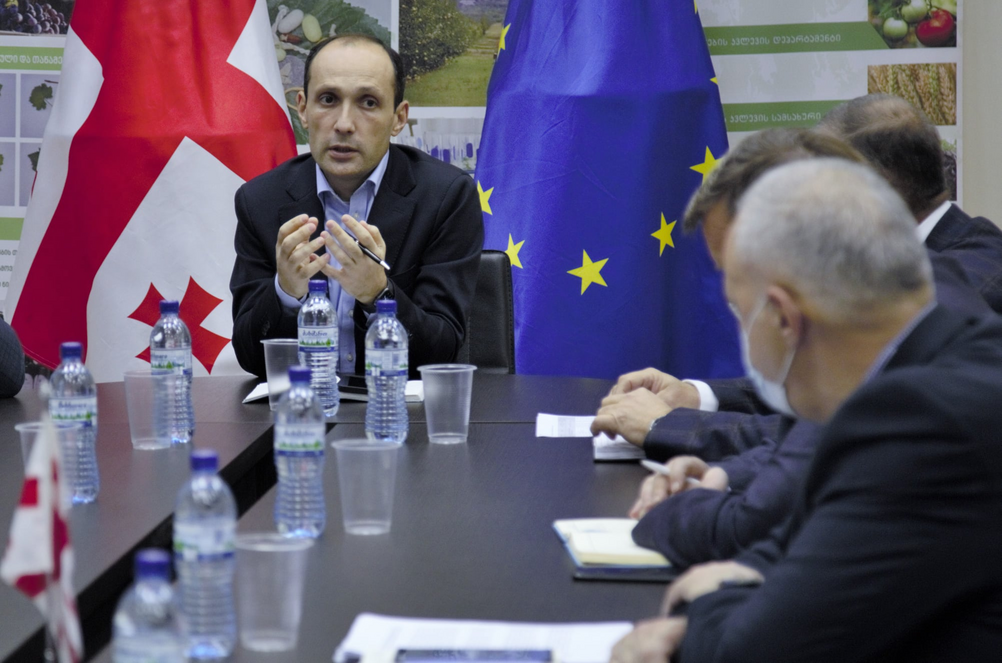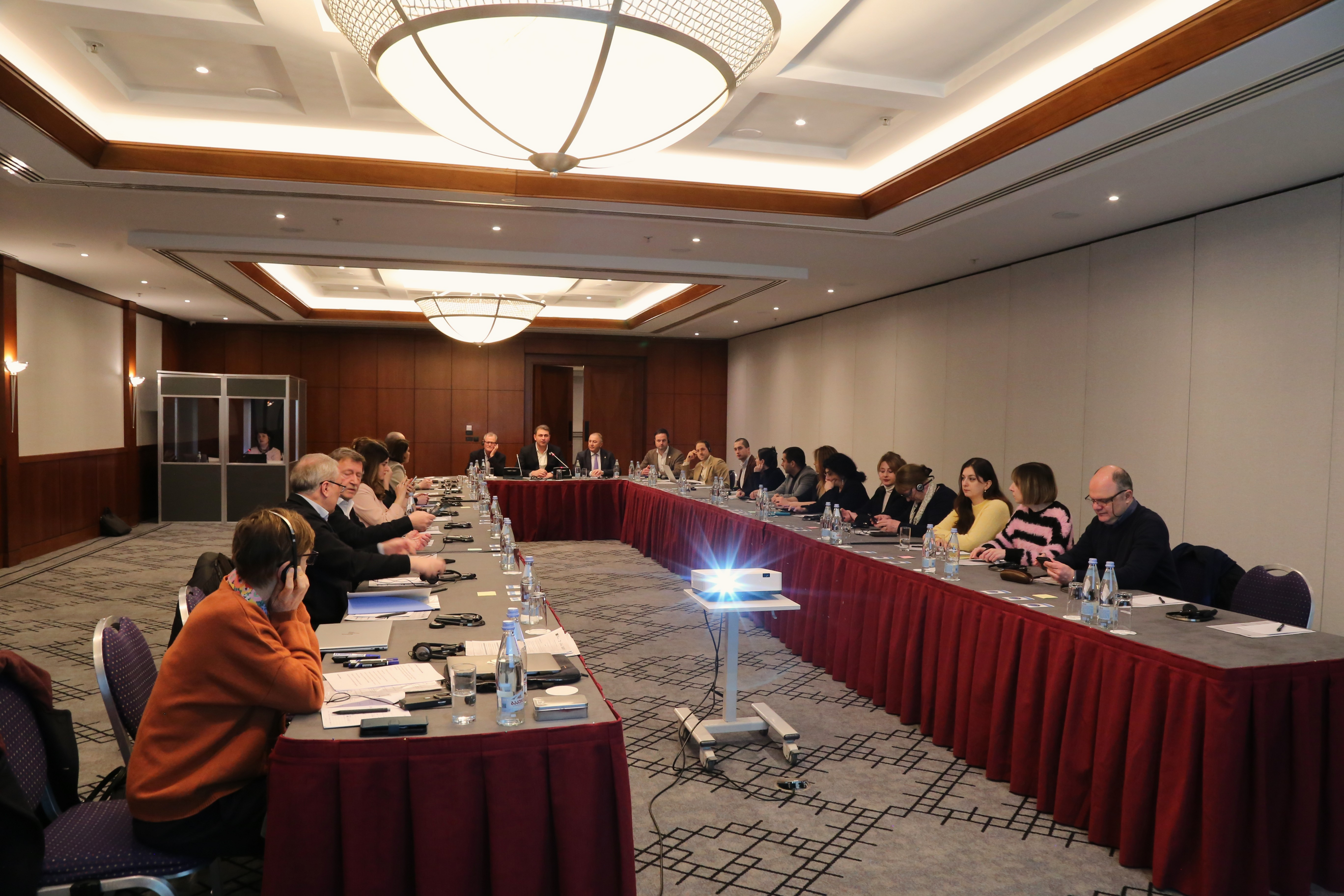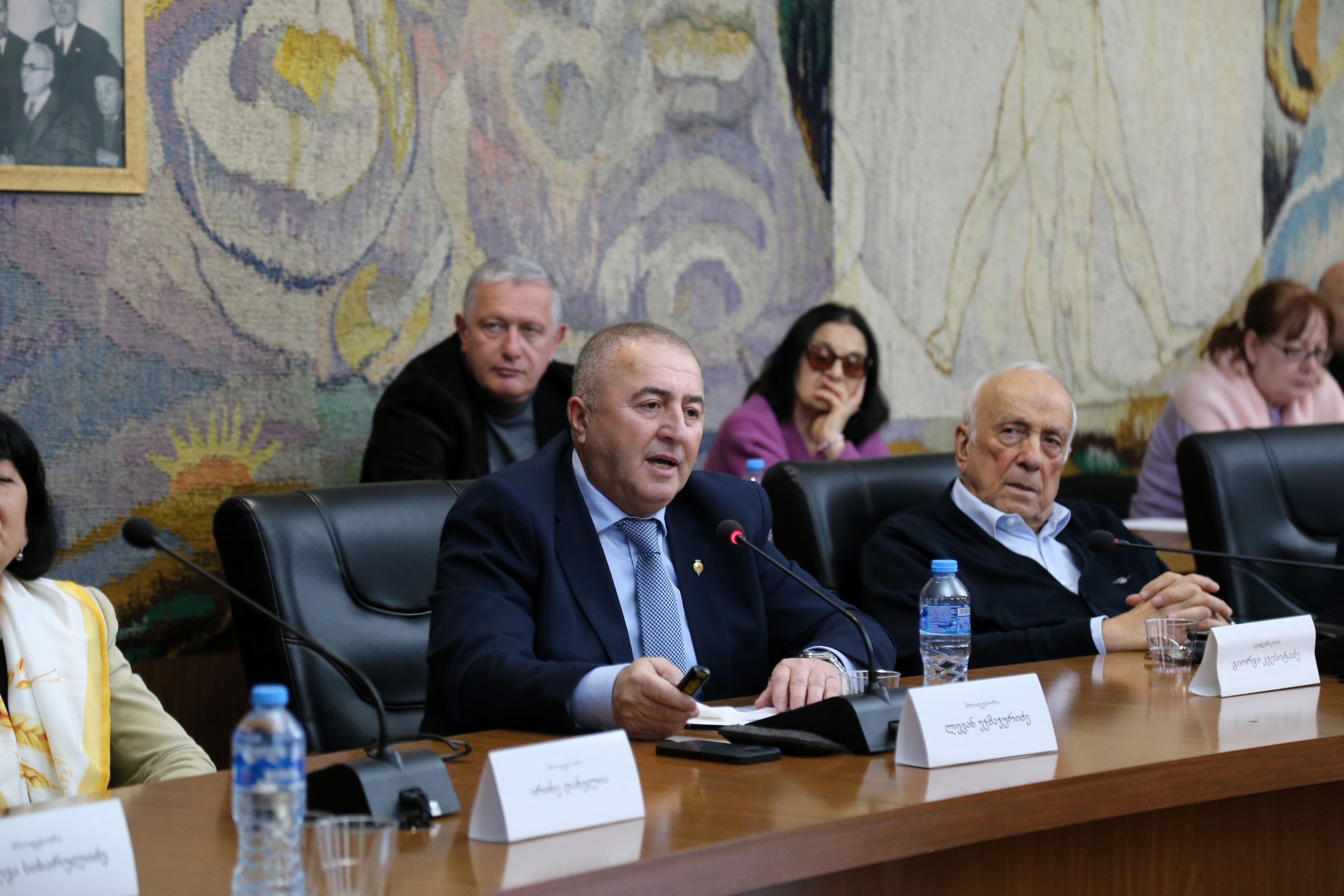News
03.12.2021
The Minister of Environmental Protection and Agriculture of Georgia Levan Davitashvili met with the leadership of the LEPL Scientific-Research Center of Agriculture
 The Minister of Environmental Protection and Agriculture of Georgia Levan Davitashvili met with the leadership of the LEPL Scientific-Research Center of Agriculture. At the working meeting, the Minister heard information about the results of the current year and discussed the plans for 2022.
The Minister of Environmental Protection and Agriculture of Georgia Levan Davitashvili met with the leadership of the LEPL Scientific-Research Center of Agriculture. At the working meeting, the Minister heard information about the results of the current year and discussed the plans for 2022.
The meeting focused on finding, protecting and conserving the genetic resources of plants and animals. In order to preserve the agro-biodiversity of plants, including perennial crops, on the bases owned by the center (Mtskheta Municipality, Jighaura village, Ozurgeti municipality, Anaseuli village) are preserved vines (450 local varieties, 149 forms of wild vines, 350 introduced varieties, 14 phylloxera resistant species and clonal base nurseries), Fruit (more than 450 local and introduced varieties and rootstocks), subtropical (more than 30 varieties and rootstocks), and agroforestry (88 forest species, 25 poplar and 30 mulberry) crops.
The conversation focused on finding the genetic resources of annual crops, including cereals, and enriching the long-term collection of the Seed Genetic Bank, where Georgian wheat species, varieties and local varieties have already been included in parallel with different crops. 5 endemic species and 9 varieties of Georgian wheat ,,Doli’’ bread. Particular attention was paid to endemic species of cereals, vegetables and horticultural crops, issues related to the first sowing of local varieties and ongoing selection work.
In the field of animal husbandry, in order to restore and improve local breeds, populations, to create and distribute a genetic bank, cattle (mountain cows, Caucasian Tsabla, Megrelian Red), endangered Kakhetian pigs, Tushuri sheep, Imeruli breed, livestock population of semi-fine wool, fatty-tailed sheep); A bird breeding team (chicken, turkey, duck, goose) has also been created. Megrelian population of Georgian gray bees has been restored, three breeders have been created; Similar works were carried out in the field of fisheries and silkworm breeding.
The meeting focused on the development of the seed and planting material production sector and the promotion of quality control, which will become mandatory in Georgia from 2024 within the framework of fulfilling the obligations under the Association Agreement with Europe. To this end, with the assistance of FAO and USAID programs, the Scientific-Research Center continues to improve the planting material certification system. In order to bring the nurseries in line with modern standards, the center will continue to provide theoretical (training) and practical (supply of raw materials) assistance to the selected farms. To date, 175 seed quality certificates have been issued as a result of the done work and 51 nurseries have been awarded qualification status. A version of the national catalog was created, which included wheat (8 foreign, 6 Georgian) and vine (12 local) varieties; 5400 report recommendations were issued in support of state programs; More than 8000 farmers were consulted on mobile extension. The scientists-staff of the Center systematically conduct trainings and demonstration days both on the place and in the regions.
The significant emphasis was placed on the study of viticulture and winemaking, including specific microzones of viticulture, and the development and dissemination of innovative methods of organic viticulture. In 2022, research in this area will continue, the implementation of which will significantly contribute to the formation of new geographical microzones and, consequently, the registration of new appellation of origin wines. Ongoing activities in the field of food safety, phyto and veterinary risk assessment were highlighted. At the national level, the National Dietary and Nutrition Research Project was developed at the national level and submitted to the Environmental Protection Committee of the Parliament of Georgia. The meeting focused on the Center's laboratory bases, expanding their capabilities due to the modern challenges of the agro-industrial sector. In 2021, the area of soils surveyed exceeded 200,000 ha, maps reflecting soil fertility were developed; It should be noted that in the inter-laboratory evaluation organized by the UN Food and Agriculture Organization, soil fertility laboratory named after professor Ivane Sarishvili was named among the 21 best laboratories.
Within the framework of the program "Georgian Tea Rehabilitation" up to 2000 hectares of abandoned tea-plantations have been studied; Technological schemes of restoration-rehabilitation are issued on 1500 hectares. The issues of identifying Georgian rare and less common vine varieties and creating a database, studying Caucasian wild vines and its relationship with the cultivated vine gene pool, which will continue, were also discussed at the Molecular Genetics Research Laboratory. It was mentioned that in the current 2021, The Integrated Plant Protection Laboratory of the Soil and Food Diagnostic Center named after Adam beridze started functioning, where, along with modern methods of plant protection, the study of the biology of various pests, the search for biological agents and their use will be carried out on a scientific level; "On the one hand, it is important to protect and preserve biodiversity and carry out scientific research, and on the other hand, to cooperate actively with the private sector, share the results and put them into practice," - noted Levan Davitashvili. In 2022, in parallel with the search and restoration of rare vine varieties at the research base of perennial crops, the work will continue to identify the potential of promising vine varieties; The Center will continue to hold active thematic meetings with representatives of the private sector of the vine and wine sector, which will help to promote wines made from rare grape varieties and return them to the production direction. Collaboration with agricultural and other stakeholders will also be actively pursued to reflect the recommendations and findings of farmers based on the results of the Center's research.
In the next 2022, scientific work will continue: in the direction of breeding, micro-clonal plant propagation, integrated plant protection systems, development of modern technologies for storage and processing of agricultural products, food, phytosanitary and veterinary risk assessment and agro-engineering research. International cooperation will be strengthened, which will facilitate the introduction of new intensive varieties, innovative technologies, experience sharing, joint research, which will create new opportunities for the agro-industrial sector.






